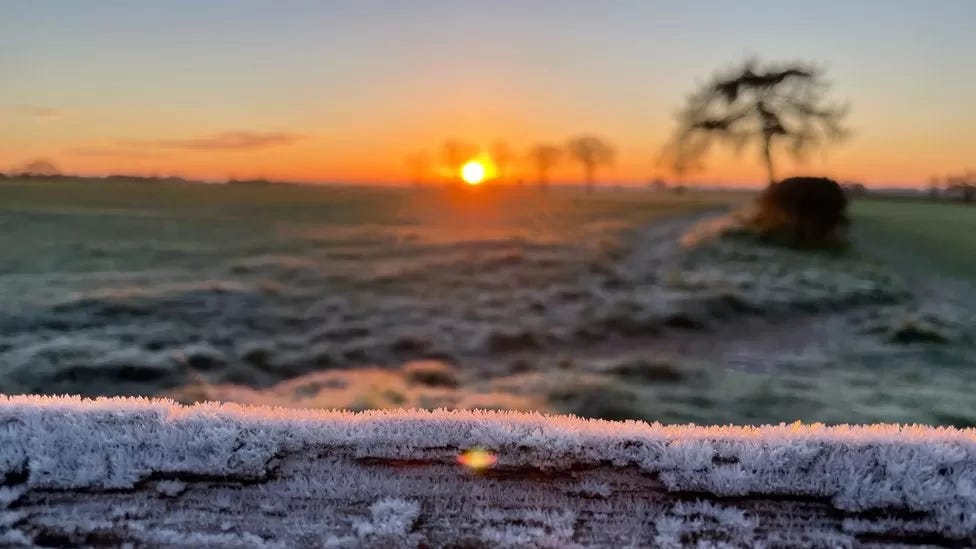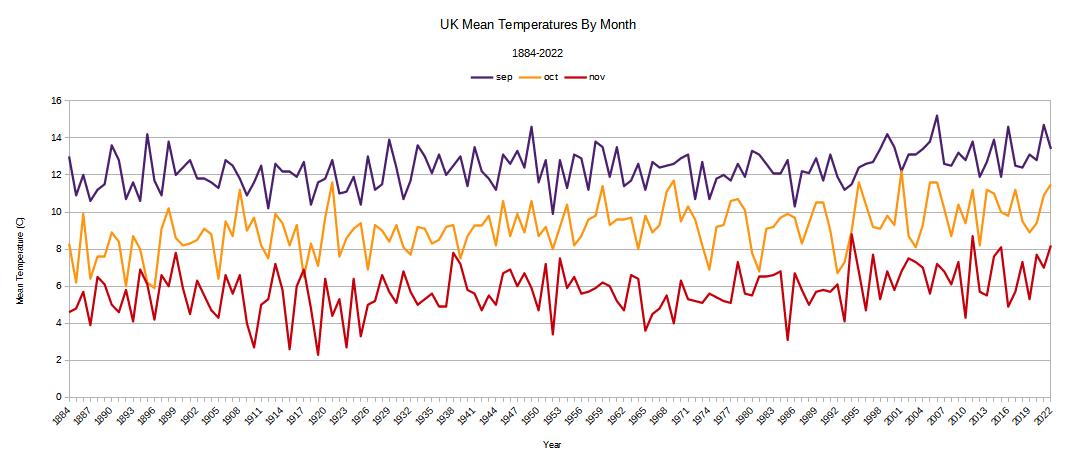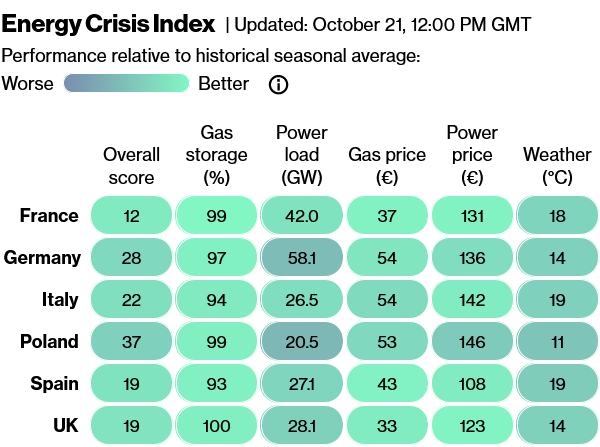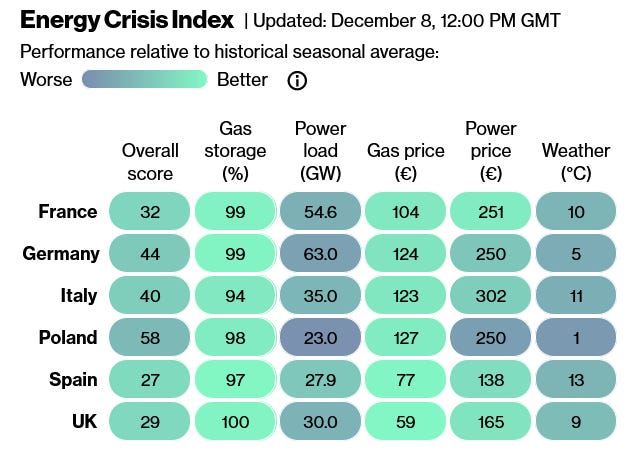Winter weather conditions have descended over the Scottish highlands, and a cold weather alert is in place for England through the weekend.
Temperatures went as low as -9.1C (15F) in the Scottish Highlands and -8.9C in Cumbria, overnight figures showed.
A cold weather alert for England will run until 09:00 GMT on Monday.
It is issued by the UK Health Security Agency (UKHSA) when the weather is cold enough to be likely to affect people's health.
As parts of the UK are hit by freezing conditions, a fuel poverty charity has called on the government to provide more support for "those at greatest peril".
With freezing cold temperatures in the north of the country, one would expect that a surge in demand for heating would produce a run on natural gas, as demand for the fuel would naturally increase during such a period.
And one would be wrong.
While the price for UK natural gas has been rising in recent weeks, the increase has not been at all like the surge in price that occurred during the summer months, and as of December 8, the spot price for UK natural gas actually settled down, dropping to 349.59 pence per therm from the previous day’s settlement at 374.49 pence per therm.
This is not to say that gas prices are not up—they are. The December 7th peak was more than double the most recent low price for UK natural gas of 183.2 pence per therm on October 24.
Yet the vast majority of that increase occurred during the month of November, with the final settlement price for natural gas in the UK for November just below the December 7th peak at 369.65 pence per therm. November, however, was one of the warmest on record for Scotland, with the minimum temperature for November being higher than in recent years.
In fact, the minimum temperature in Scotland for November was the 5th highest dating back to 1884.
For the entire United Kingdom, November was the 3rd warmest on record by mean temperature.
Those are not the sort of temperatures to spark high demand for heating and thus for natural gas, yet that was when the price for natural gas increased.
Spot prices for natural gas in Europe have followed a similar trajectory, including the December 8th easing from a December 7th peak, indicating the UK price movements in natural gas are not anomalous.
Across the continent, it seems, the price for natural gas rose most during a month when the demand for natural gas for heating would be relatively low, while the recent arrival of winter weather has resulted in a small drop in the commodity price for natural gas.
While natural gas prices doubled in November, Britain’s overall energy stress as measured by Bloomberg’s Energy Crisis Index did not. As of October 21, Britain’s energy stress index metric was 19, with consumer gas prices at €33 per Mw/H and electricity prices at €123 per Mw/H.
As of December 8, the UK’s crisis index was at 29 (higher means greater crisis), with gas prices at €59 per Mw/H and electricity prices at €165 per Mw/H.
While gas storage is still at 100%, gas prices rose by 79% and electricity prices rose by 34% during one of the warmest Novembers on record for the UK. Yet if recent natural gas prices on commodity markets is any guide, the current freezing spell is not (yet) likely to produce a great surge in energy prices—and gas and power prices do rise, it will be unsupported by spot prices for energy (natural gas).
Indeed, with gas storage for the UK holding at 100%, the question has to be asked why gas prices have doubled. Gas storage is meant to buffer prices during the winter months when demand peaks, but that buffering is accomplished by a gradual drawdown of the stored gas. With stored gas reserves not being touched, the UK does not appear to be buffering its energy prices or costs at all.
This much is clear, the primary driver for energy prices in the United Kingdom is not temperature, at least not directly.
Yet the reporting draws exactly that correlation. In reporting on the cold snap in Scotland, the BBC highlighted that the freezing temperatures were making some households eligible for special Cold Weather Payments—special supplemental government transfers available once per every seven days during periods of significant cold weather.
The government has triggered Cold Weather Payments for eligible people across large parts of England and Wales. It is paid once in a seven-day period and people can check if they will receive it online.
For its part, the Guardian is casting the freezing temperatures in Scotland as forcing impoverished people to choose between eating and heating their homes.
In years past, reports of cold weather might have brought up hope of a white Christmas. This winter, however, the prospect of snow on Christmas Day isn’t a cause for celebration for millions of people in the UK, who may be in a position where they have to pick between eating and staying warm. It’s -6C and -7C in parts of the country as this email is sent, while temperatures are expected to drop to -10C in northern Scotland. This Arctic breeze has triggered a level three “severe” cold weather alert for England, which is expected to continue until 12 December. However, if these low temperatures persist then it is likely that it will stay.
To be clear, the cold temperatures will undoubtedly result in greater usage of gas and electricity to keep houses warm, but that increased usage comes after a rise in energy prices during a comparitively warm November, when the increase in heating demand would rationally be expected to be less than normal. In theory, the heating costs not incurred during November are being incurred now, after the prices have more or less doubled for consumers.
This is backwards from what should be happening. If energy demand (greater usage of heating) is driving costs up, the energy price increases to British households should only be occurring now, not before a temperature related increase in energy demand. Yet that is what is transpiring thus far during this cold spell in Britain, prices have risen ahead of demand rather than after it.
It may yet turn out that there will be another doubling of natural gas commodity prices and a further doubling of energy prices to UK households, as the cold weather pushes demand and usage higher. Indeed, that should almost be expected as winter weather settles in over Britain and over Europe. Cold weather drives heating demand which drives up energy prices.
Yet the anticipated price rises coming on the heels of a surge in demand do little to explain the price rises that have occurred ahead of that same surge. Warm weather such as the UK had in November does not drive up heating demand and related energy prices.
Winter may have come to the UK, but how the price rises arrived first remains very much an unexplained phenomenon.










My sister lives in Ireland on a rather fixed income. She’s an artist and they suffer first when the economy wobbles. I’m worried as Ireland government is full of dunderheads like everywhere else. But she took leave of her senses and put ALL her trust in the government during Covid. Even after seeing the total destruction of her business caused mainly by the Irish government during Meltdown back in 2008. Covid hurt her business just as much. But politicians and MSM have her back according to her. Sad.
Do you see or suspect any big events such as a false flag terror plot or equipment failure like we had in Texas a few winters ago enabling massive price increases and profit taking by the usual suspects, or is this less likely in the British Isles.
To me, something about this doesn't "feel right."